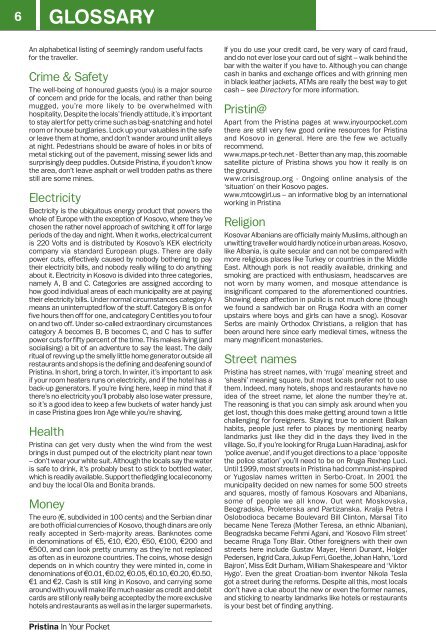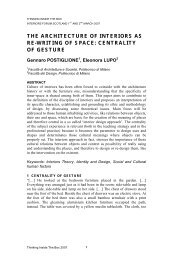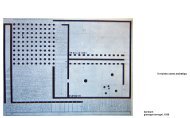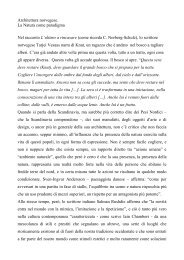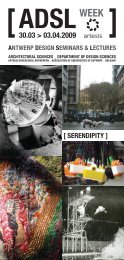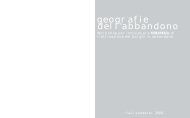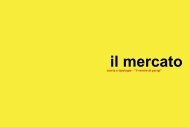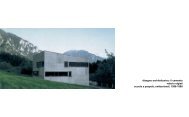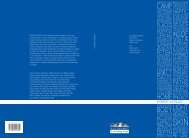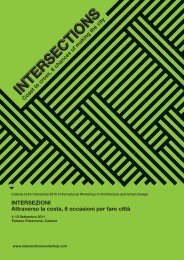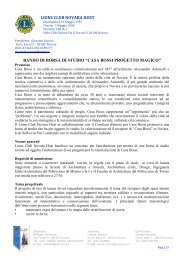Create successful ePaper yourself
Turn your PDF publications into a flip-book with our unique Google optimized e-Paper software.
6<br />
GLOSSARY<br />
GLOSSARY<br />
7<br />
An alphabetical listing of seemingly random useful facts<br />
for the traveller.<br />
Crime & Safety<br />
The well-being of honoured guests (you) is a major source<br />
of concern and pride for the locals, and rather than being<br />
mugged, you’re more likely to be overwhelmed with<br />
hospitality. Despite the locals’ friendly attitude, it’s important<br />
to stay alert for petty crime such as bag-snatching and hotel<br />
room or house burglaries. Lock up your valuables in the safe<br />
or leave them at home, and don’t wander around unlit alleys<br />
at night. Pedestrians should be aware of holes in or bits of<br />
metal sticking out of the pavement, missing sewer lids and<br />
surprisingly deep puddles. Outside Pristina, if you don’t know<br />
the area, don’t leave asphalt or well trodden paths as there<br />
still are some mines.<br />
Electricity<br />
Electricity is the ubiquitous energy product that powers the<br />
whole of Europe with the exception of Kosovo, where they’ve<br />
chosen the rather novel approach of switching it off for large<br />
periods of the day and night. When it works, electrical current<br />
is 220 Volts and is distributed by Kosovo’s KEK electricity<br />
company via standard European plugs. There are daily<br />
power cuts, effectively caused by nobody bothering to pay<br />
their electricity bills, and nobody really willing to do anything<br />
about it. Electricity in Kosovo is divided into three categories,<br />
namely A, B and C. Categories are assigned according to<br />
how good individual areas of each municipality are at paying<br />
their electricity bills. Under normal circumstances category A<br />
means an uninterrupted flow of the stuff. Category B is on for<br />
five hours then off for one, and category C entitles you to four<br />
on and two off. Under so-called extraordinary circumstances<br />
category A becomes B, B becomes C, and C has to suffer<br />
power cuts for fifty percent of the time. This makes living (and<br />
socialising) a bit of an adventure to say the least. The daily<br />
ritual of revving up the smelly little home generator outside all<br />
restaurants and shops is the defining and deafening sound of<br />
Pristina. In short, bring a torch. In winter, it’s important to ask<br />
if your room heaters runs on electricity, and if the hotel has a<br />
back-up generators. If you’re living here, keep in mind that if<br />
there’s no electricity you’ll probably also lose water pressure,<br />
so it’s a good idea to keep a few buckets of water handy just<br />
in case Pristina goes Iron Age while you’re shaving.<br />
Health<br />
Pristina can get very dusty when the wind from the west<br />
brings in dust pumped out of the electricity plant near town<br />
– don’t wear your white suit. Although the locals say the water<br />
is safe to drink, it’s probably best to stick to bottled water,<br />
which is readily available. Support the fledgling local economy<br />
and buy the local Ola and Bonita brands.<br />
Money<br />
The euro (€, subdivided in 100 cents) and the Serbian dinar<br />
are both official currencies of Kosovo, though dinars are only<br />
really accepted in Serb-majority areas. Banknotes come<br />
in denominations of €5, €10, €20, €50, €100, €200 and<br />
€500, and can look pretty crummy as they’re not replaced<br />
as often as in eurozone countries. The coins, whose design<br />
depends on in which country they were minted in, come in<br />
denominations of €0.01, €0.02, €0.05, €0.10, €0.20, €0.50,<br />
€1 and €2. Cash is still king in Kosovo, and carrying some<br />
around with you will make life much easier as credit and debit<br />
cards are still only really being accepted by the more exclusive<br />
hotels and restaurants as well as in the larger supermarkets.<br />
If you do use your credit card, be very wary of card fraud,<br />
and do not ever lose your card out of sight – walk behind the<br />
bar with the waiter if you have to. Although you can change<br />
cash in banks and exchange offices and with grinning men<br />
in black leather jackets, ATMs are really the best way to get<br />
cash – see Directory for more information.<br />
Pristin@<br />
Apart from the Pristina pages at www.inyourpocket.com<br />
there are still very few good online resources for Pristina<br />
and Kosovo in general. Here are the few we actually<br />
recommend.<br />
www.maps.pr-tech.net - Better than any map, this zoomable<br />
satellite picture of Pristina shows you how it really is on<br />
the ground.<br />
www.crisisgroup.org - Ongoing online analysis of the<br />
‘situation’ on their Kosovo pages.<br />
www.mtcowgirl.us – an informative blog by an international<br />
working in Pristina<br />
Religion<br />
Kosovar Albanians are officially mainly Muslims, although an<br />
unwitting traveller would hardly notice in urban areas. Kosovo,<br />
like Albania, is quite secular and can not be compared with<br />
more religious places like Turkey or countries in the Middle<br />
East. Although pork is not readily available, drinking and<br />
smoking are practiced with enthusiasm, headscarves are<br />
not worn by many women, and mosque attendance is<br />
insignificant compared to the aforementioned countries.<br />
Showing deep affection in public is not much done (though<br />
we found a sandwich bar on Rruga Kodra with an corner<br />
upstairs where boys and girls can have a snog). Kosovar<br />
Serbs are mainly Orthodox Christians, a religion that has<br />
been around here since early medieval times, witness the<br />
many magnificent monasteries.<br />
Street names<br />
Pristina has street names, with ‘rruga’ meaning street and<br />
‘sheshi’ meaning square, but most locals prefer not to use<br />
them. Indeed, many hotels, shops and restaurants have no<br />
idea of the street name, let alone the number they’re at.<br />
The reasoning is that you can simply ask around when you<br />
get lost, though this does make getting around town a little<br />
challenging for foreigners. Staying true to ancient Balkan<br />
habits, people just refer to places by mentioning nearby<br />
landmarks just like they did in the days they lived in the<br />
village. So, if you’re looking for Rruga Luan Haradinaj, ask for<br />
‘police avenue’, and if you get directions to a place ‘opposite<br />
the police station’ you’ll need to be on Rruga Rexhep Luci.<br />
Until 1999, most streets in Pristina had communist-inspired<br />
or Yugoslav names written in Serbo-Croat. In 2001 the<br />
municipality decided on new names for some 500 streets<br />
and squares, mostly of famous Kosovars and Albanians,<br />
some of people we all know. Out went Moskovska,<br />
Beogradska, Proleterska and Partizanska. Kralja Petra I<br />
Oslobodioca became Boulevard Bill Clinton, Marsal Tito<br />
became Nene Tereza (Mother Teresa, an ethnic Albanian),<br />
Beogradska became Fehmi Agani, and ‘Kosovo Film street’<br />
became Rruga Tony Blair. Other foreigners with their own<br />
streets here include Gustav Mayer, Henri Dunant, Holger<br />
Pedersen, Ingrid Cara, Jukup Ferri, Goethe, Johan Hahn, ‘Lord<br />
Bajron’, Miss Edit Durham, William Shakespeare and ‘Viktor<br />
Hygo’. Even the great Croatian-born inventor Nikola Tesla<br />
got a street during the reforms. Despite all this, most locals<br />
don’t have a clue about the new or even the former names,<br />
and sticking to nearby landmarks like hotels or restaurants<br />
is your best bet of finding anything.<br />
Predominantly continental, meaning warm summers<br />
and cold winters.<br />
rainfall (mm)<br />
Climate<br />
70<br />
60<br />
50<br />
40<br />
30<br />
20<br />
10<br />
0<br />
Jan Feb Mar Apr May Jun Jul Aug Sep Oct Nov Dec<br />
rainfall average daily temp. (max) average daily temp. (min)<br />
Toilets<br />
There are no public toilets in Pristina – your best bet is to<br />
walk into any hotel, café or restaurant and ask if nature<br />
calls. Be aware that restaurant toilets are often unheated<br />
in winter – be quick.<br />
UNMIK & KFOR<br />
Although Kosovo has its own layer of politicians and<br />
ministries, the UN in the form of the United Nations<br />
Mission In Kosovo, or UNMIK, has been firmly in charge<br />
of everything since 1999. It employs vast numbers of<br />
foreigners in Pristina, and we get the impression that many<br />
of them don’t really want to be. Security Council Resolution<br />
1244 states that Kosovo remains part of Serbia but is<br />
governed by the provisional UN mission, which has four pillars<br />
(sections) dealing with everyday life; police and justice, civil<br />
administration, democratisation and institution-building, and<br />
reconstruction and economic development. The UN also<br />
has its own police force, supported by the NATO-led KFOR<br />
(Kosovo Force) troops. Interestingly, the UNMIK uses K-<br />
Albanians and K-Serbians to refer to the locals. UNMIK does<br />
not have an easy task, made more difficult by not having a set<br />
deadline unlike most UN missions. Although it has managed<br />
to improve daily life in many ways, it has faced criticism for<br />
being unable to fix the electricity problem after seven years,<br />
and has also raised eyebrows for allegedly being the cause of<br />
an increase in human trafficking due to the sexual appetite<br />
of foreign peacekeepers – though steps have been taken to<br />
counter this. The apparent lack of democracy gets Kosovo<br />
its nickname ‘Unmikistan’.<br />
Visas & Borders<br />
Citizens of the EU, the USA and Canada and can stay in<br />
Kosovo for 90 days without further paperwork. After this<br />
period, extensions can be requested from the Pristina’s<br />
main police office on Rr. Luan Haradinaj. Not actually being<br />
a country, arrival formalities at the borders and airport are<br />
dealt with by UNMIK staff wearing large hats that appear to<br />
have been borrowed from the NYPD circa 1955. As Kosovo<br />
is officially part of Serbia, the Serbians don’t acknowledge<br />
the UNMIK entry stamps you have, nor the Serbia-Kosovo<br />
border, and accordingly refuse to stamp your passport if<br />
you enter Serbia from Kosovo. Although you usually can<br />
get into Serbia on an UNMIK entry stamp, this can lead to<br />
problems when you try to leave Serbia any other way than<br />
back via Kosovo. The best advice we can give is don’t try<br />
it. The other way round though, it’s not a problem to enter<br />
40<br />
30<br />
20<br />
10<br />
0<br />
-10<br />
-20<br />
-30<br />
temperature (°C)<br />
Kosovo from Serbia and then leave via another country.<br />
To avoid problems with later travel to Serbia, Albanian and<br />
Macedonian nationals don’t get UNMIK entry or exit stamps<br />
in their passport, while all others do.<br />
Wheelchair users<br />
The amount of money being poured into Kosovo by the UN<br />
and others is truly astonishing, a fact that appears ridiculous<br />
when you look around you. Where is it all going? It’s certainly<br />
not being used to benefit the disabled. What pavements<br />
there are in Pristina pose a big enough threat to the ablebodied.<br />
If you’re in a wheelchair, forget it. Officially, all state<br />
buildings have ‘made arrangements’ for wheelchair users.<br />
What this actually means is anyone’s guess.<br />
Basic data<br />
Official name: Kosova<br />
Population<br />
Kosovo 2,473,000 (OSCE 2005 estimate)<br />
Pristina 220,000 (IKS/ESI estimate, 2006)<br />
Ethnic composition<br />
Albanian 88%, Serbian 7%, Others 5%<br />
Religion: Muslim 90%, Others 10%<br />
Territory: 854km 2<br />
Geography<br />
Kosovo is located in southeastern Europe in the central<br />
Balkan Peninsula. Entirely surrounded by high mountains<br />
its terrain is varied, ranging from high plains some 500<br />
metres above sea level to hills and mountains, of which<br />
the latter reach a height of 2,000 metres. The city of<br />
Pristina covers 572 km2 and can be found between 535<br />
and 580 metres above sea level.<br />
Rivers<br />
The longest river in Kosovo is the Drini i Bardhë (122km)<br />
that flows through Albania and out into the Adriatic. Other<br />
notable rivers include the Sitnica (90km), Lumbardhi<br />
i Pejës/Bistrica e Pejës (62km), Ereniku (51km), and<br />
the Lumbardhi i Prizrenit/Bistrica e Prizrenit (31km).<br />
Elevation<br />
The highest mountain in Kosovo is Gjeravica (2,656m),<br />
which is located in the Peja region in the west of the<br />
country. Other notable mountains include Bistra<br />
(2,640m) in the Ferizaj region, Marjash (2,530m) in the<br />
Peja region, and Luboteni (2,496m) in the Ferizaj region.<br />
Borders<br />
UNMIK controls the border of the landlocked province<br />
with Serbia (border length 351.6km) to the north and<br />
northeast. Kosovo is bordered by three countries, namely<br />
Montenegro (78.6km) to the northwest, Macedonia<br />
(158.7km) to the south and Albania (111.8km) to the<br />
west and southwest.<br />
Local time<br />
Kosovo is in Central European Time (CET), GMT+1 hour.<br />
When it’s 12:00 in Pristina it’s 06:00 in New York, 11:00<br />
in London and 19:00 in Tokyo. Central European Summer<br />
Time (GMT+2 hours) runs from the last Sunday in March<br />
until the last Sunday in October.<br />
Pristina In Your Pocket<br />
2006 - 2007


